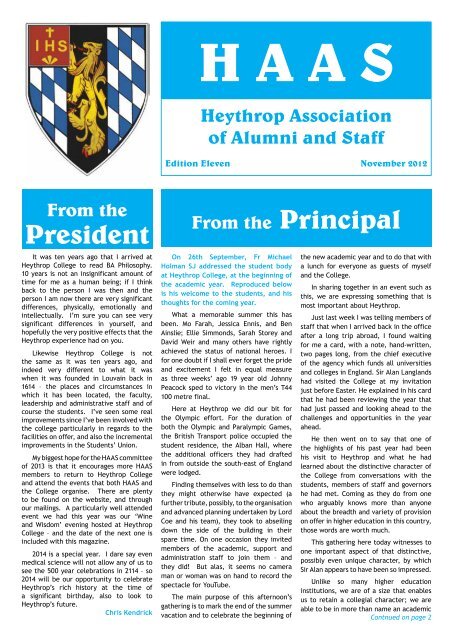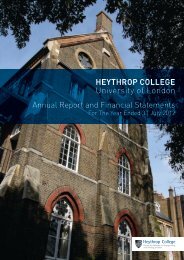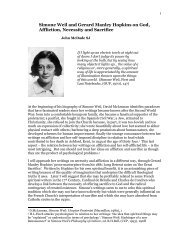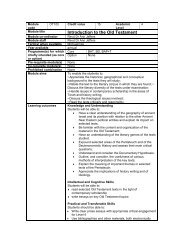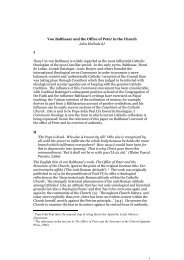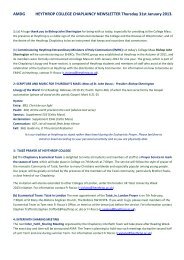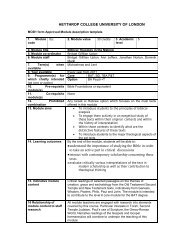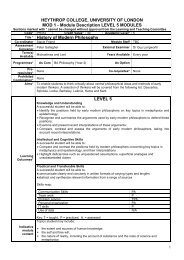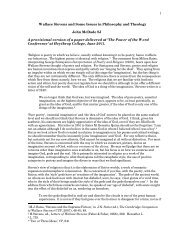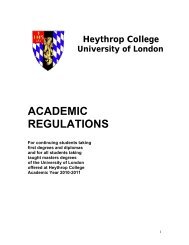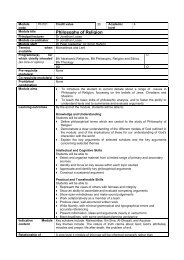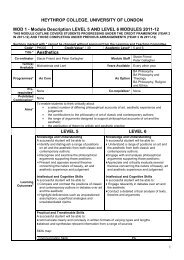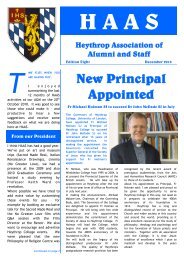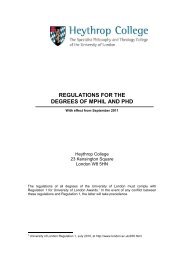November 2012 - Heythrop College
November 2012 - Heythrop College
November 2012 - Heythrop College
You also want an ePaper? Increase the reach of your titles
YUMPU automatically turns print PDFs into web optimized ePapers that Google loves.
H A A S<br />
<strong>Heythrop</strong> Association<br />
of Alumni and Staff<br />
Edition Eleven <strong>November</strong> <strong>2012</strong><br />
From the<br />
President<br />
It was ten years ago that I arrived at<br />
<strong>Heythrop</strong> <strong>College</strong> to read BA Philosophy.<br />
10 years is not an insignificant amount of<br />
time for me as a human being; if I think<br />
back to the person I was then and the<br />
person I am now there are very significant<br />
differences, physically, emotionally and<br />
intellectually. I’m sure you can see very<br />
significant differences in yourself, and<br />
hopefully the very positive effects that the<br />
<strong>Heythrop</strong> experience had on you.<br />
Likewise <strong>Heythrop</strong> <strong>College</strong> is not<br />
the same as it was ten years ago, and<br />
indeed very different to what it was<br />
when it was founded in Louvain back in<br />
1614 – the places and circumstances in<br />
which it has been located, the faculty,<br />
leadership and administrative staff and of<br />
course the students. I’ve seen some real<br />
improvements since I’ve been involved with<br />
the college particularly in regards to the<br />
facilities on offer, and also the incremental<br />
improvements in the Students’ Union.<br />
My biggest hope for the HAAS committee<br />
of 2013 is that it encourages more HAAS<br />
members to return to <strong>Heythrop</strong> <strong>College</strong><br />
and attend the events that both HAAS and<br />
the <strong>College</strong> organise. There are plenty<br />
to be found on the website, and through<br />
our mailings. A particularly well attended<br />
event we had this year was our ‘Wine<br />
and Wisdom’ evening hosted at <strong>Heythrop</strong><br />
<strong>College</strong> – and the date of the next one is<br />
included with this magazine.<br />
2014 is a special year. I dare say even<br />
medical science will not allow any of us to<br />
see the 500 year celebrations in 2114 – so<br />
2014 will be our opportunity to celebrate<br />
<strong>Heythrop</strong>’s rich history at the time of<br />
a significant birthday, also to look to<br />
<strong>Heythrop</strong>’s future.<br />
Chris Kendrick<br />
From the Principal<br />
On 26th September, Fr Michael<br />
Holman SJ addressed the student body<br />
at <strong>Heythrop</strong> <strong>College</strong>, at the beginning of<br />
the academic year. Reproduced below<br />
is his welcome to the students, and his<br />
thoughts for the coming year.<br />
What a memorable summer this has<br />
been. Mo Farah, Jessica Ennis, and Ben<br />
Ainslie; Ellie Simmonds, Sarah Storey and<br />
David Weir and many others have rightly<br />
achieved the status of national heroes. I<br />
for one doubt if I shall ever forget the pride<br />
and excitement I felt in equal measure<br />
as three weeks’ ago 19 year old Johnny<br />
Peacock sped to victory in the men’s T44<br />
100 metre final.<br />
Here at <strong>Heythrop</strong> we did our bit for<br />
the Olympic effort. For the duration of<br />
both the Olympic and Paralympic Games,<br />
the British Transport police occupied the<br />
student residence, the Alban Hall, where<br />
the additional officers they had drafted<br />
in from outside the south-east of England<br />
were lodged.<br />
Finding themselves with less to do than<br />
they might otherwise have expected (a<br />
further tribute, possibly, to the organisation<br />
and advanced planning undertaken by Lord<br />
Coe and his team), they took to abseiling<br />
down the side of the building in their<br />
spare time. On one occasion they invited<br />
members of the academic, support and<br />
administration staff to join them – and<br />
they did! But alas, it seems no camera<br />
man or woman was on hand to record the<br />
spectacle for YouTube.<br />
The main purpose of this afternoon’s<br />
gathering is to mark the end of the summer<br />
vacation and to celebrate the beginning of<br />
the new academic year and to do that with<br />
a lunch for everyone as guests of myself<br />
and the <strong>College</strong>.<br />
In sharing together in an event such as<br />
this, we are expressing something that is<br />
most important about <strong>Heythrop</strong>.<br />
Just last week I was telling members of<br />
staff that when I arrived back in the office<br />
after a long trip abroad, I found waiting<br />
for me a card, with a note, hand-written,<br />
two pages long, from the chief executive<br />
of the agency which funds all universities<br />
and colleges in England. Sir Alan Langlands<br />
had visited the <strong>College</strong> at my invitation<br />
just before Easter. He explained in his card<br />
that he had been reviewing the year that<br />
had just passed and looking ahead to the<br />
challenges and opportunities in the year<br />
ahead.<br />
He then went on to say that one of<br />
the highlights of his past year had been<br />
his visit to <strong>Heythrop</strong> and what he had<br />
learned about the distinctive character of<br />
the <strong>College</strong> from conversations with the<br />
students, members of staff and governors<br />
he had met. Coming as they do from one<br />
who arguably knows more than anyone<br />
about the breadth and variety of provision<br />
on offer in higher education in this country,<br />
those words are worth much.<br />
This gathering here today witnesses to<br />
one important aspect of that distinctive,<br />
possibly even unique character, by which<br />
Sir Alan appears to have been so impressed.<br />
Unlike so many higher education<br />
institutions, we are of a size that enables<br />
us to retain a collegial character; we are<br />
able to be in more than name an academic<br />
Contnued on page 2
2<br />
community, a community of students and<br />
scholars, able to sit down or stand around<br />
and share a meal together. A number of you<br />
will already have experienced this feature<br />
of <strong>Heythrop</strong> life during one or other of our<br />
open days and it’s a characteristic of this<br />
college which has impressed me in my first<br />
months as Principal.<br />
What unites us is an interest in, often a<br />
passion for, two academic disciplines which<br />
can open doors not only to knowledge but to<br />
wisdom and which can equip us not only for<br />
employment but also, if we are so minded,<br />
and our students have for centuries been<br />
so minded, to make a positive difference<br />
to those others with whom we share this<br />
planet, especially those most in need.<br />
Our community comes from many<br />
places, embraces younger and older<br />
students who represent many cultures,<br />
many religious and secular perspectives.<br />
We study in the library together, sit sideby-side<br />
in lectures together, pursue our<br />
interest in some of life’s most significant<br />
questions and argue in seminars together<br />
- and we can stand around and sit<br />
around and share a meal together. This<br />
is the character of our <strong>College</strong> which we<br />
celebrate today and in many ways this<br />
character represents the Jesuit tradition<br />
of Catholic higher education – the tradition<br />
in which we stand - at its best.<br />
If the end of the academic year was the<br />
moment Sir Alan chose to look back over<br />
the year that had passed and look forward<br />
to the opportunities and challenges of the<br />
year ahead, I happen to do that at times<br />
such as this, at the beginning of the new<br />
academic year.<br />
One of the features of the <strong>Heythrop</strong><br />
community which I have come to<br />
appreciate in the last nine months, since<br />
January when I arrived as Principal, is<br />
the active participation of students in<br />
the business of the college: in many<br />
conversations joining members of staff and<br />
governors in committees about academic<br />
programmes, performance, policy and the<br />
strategic direction of the <strong>College</strong>. Indeed,<br />
just last Friday, the President and the Vice<br />
President of the Student Union, Ashley<br />
Doolan and Alex Hackett, made valuable<br />
contributions to the day which Governors<br />
each year set aside to discuss strategy.<br />
I value this participation: the students’<br />
perspective is crucial and that’s why I<br />
owe you it to you all, now and at regular<br />
intervals in the future, to provide a report<br />
on where we are, where we are going, and<br />
why. And if we can find other forums in<br />
which to discuss these and other points,<br />
that in my book would be an added bonus.<br />
What matters much to me, even most<br />
of all, is your achievement. It matters that<br />
you fulfil your potential and that we do all<br />
we can to help you do that. That’s why,<br />
when showing visitors around, we stop at<br />
the undergraduate examination results on<br />
the notice boards on the corridor leading<br />
from here to the dining room. For sure,<br />
each result tells a story. One student who<br />
obtained a first was asked the secret of<br />
his success. Note this: “I attended every<br />
tutorial” was his reply.<br />
We now have the enrolment figures for<br />
all our Master’s degrees. Numbers have<br />
held up and even increased despite the<br />
recession and the squeeze on our finances<br />
we are all experiencing: a sure sign that<br />
our reputation for the quality of our<br />
teaching and learning is sound and secure.<br />
What’s more, a university league table<br />
published in the Guardian newspaper<br />
some three months ago indicated that we<br />
added more value to student performance<br />
than some of those larger colleges and<br />
universities which we might consider our<br />
principle competitors. All this is good<br />
news.<br />
But making sure we move further<br />
forward is the thing. These past two terms<br />
we have done a great deal to review the<br />
ways in which we teach so now we have<br />
added small group seminar work in the<br />
first year of the undergraduate degrees in<br />
addition to the lectures and those one-toone<br />
tutorials which have been our staple<br />
for decades. We’ll be looking for your<br />
feed-back on how these developments<br />
progress just as we will be looking for<br />
your participation in considering all the<br />
data we now have from the results of our<br />
National Student Survey which third year<br />
undergraduates here and everywhere up<br />
and down the country were encouraged<br />
to complete last March. All of this is about<br />
moving further forward.<br />
And so too is this. It matters to us that<br />
those who teach you from the word go are<br />
experts in their field and that teaching<br />
is research informed. We say that to you<br />
at open days and we do what we can to<br />
deliver it, not least because what we hope<br />
that amongst those sitting here are some<br />
who will become the next generation of<br />
experts. Excellence in research enhances<br />
the reputation of any higher education<br />
institution. That’s why I’m delighted that<br />
in my predecessor John McDade’s time the<br />
<strong>College</strong> secured funding from the Society<br />
of Jesus, the founders and principal<br />
sponsors of this college, for three new<br />
research professorships – in Philosophy, in<br />
Systematic Theology and in Theological<br />
Ethics - for which we soon hope to<br />
advertise.<br />
The quality of the student experience,<br />
the quality of the range of opportunities on<br />
offer, is important to us all. In this Freshers<br />
Week, those of you who are new to the<br />
<strong>College</strong> will be learning of all that is on<br />
offer through the <strong>Heythrop</strong> Student Union,<br />
through the University of London Union<br />
and in the other colleges’ roundabout with<br />
which we have agreements with respect to<br />
the use of facilities. You will also have been<br />
informed about the opportunities available<br />
through our new student enrichment<br />
programme and during the coming year<br />
we will be seeking your help in identifying<br />
what more we can do to ensure that what<br />
we offer matches as near as possible your<br />
aspirations.<br />
In this area of opportunity, I have some<br />
personal hopes. We will in the course of<br />
the next year be developing, what is not<br />
so well developed here, our international<br />
links with universities abroad. There is no<br />
doubt that colleges as far apart as New<br />
York, Sydney and Hong Kong are keen to<br />
investigate and develop partnerships with<br />
ourselves. I am concerned that in addition<br />
to offering their students opportunities<br />
for study in London, we also explore the<br />
possibility of our students from <strong>Heythrop</strong><br />
studying for courses in their centres. That<br />
study would count (of course) towards<br />
your degree here from the University of<br />
London and in a way which will make your<br />
experience that much more distinctive.<br />
There’s not much doubt that such<br />
experiences can contribute to employment<br />
potential (something which of course we all<br />
have our eyes on) but equally important is<br />
the contribution such opportunities make<br />
to our personal development.<br />
Talking of opportunities for such<br />
development, I hope you all get the chance<br />
to hear, from those who participated,<br />
about two chaplaincy ventures which took
place over the summer vacation. One party<br />
accompanied by Fr Rocco Viviano travelled<br />
to an international gathering of students<br />
at Taizé in France. Further afield, Fr David<br />
Stewart accompanied his party to Tanzania<br />
where they worked with children in the<br />
schools in the Jesuit mission in Dodoma.<br />
Both were impressive experiences for all<br />
concerned and both, I hope, will become<br />
regular events in the <strong>College</strong> calendar.<br />
There is much talk in the media right<br />
now about the many changes which the<br />
higher education world is undergoing. You<br />
know better than most others what these<br />
changes amount to, arising as they do from<br />
the decision of the present government<br />
to charge higher fees, funded initially by<br />
student loans but, alas, bringing with it the<br />
likelihood of higher levels of student debt.<br />
The initial impact of these changes is<br />
still far from clear but as you may have<br />
read in the newspapers, there are at least<br />
30,000 or as many as 50 or even 60,000<br />
fewer students beginning courses in<br />
universities this year compared with last.<br />
Personally, I am not in favour of this<br />
policy. It seems to me it is one of the first<br />
duties of government to provide for, or at<br />
least contribute to, the education of the<br />
young and more generally I do question<br />
the introduction of market principles<br />
into the provision of public services. But,<br />
regrettably in my view, for the time being<br />
at least, the changes are here to stay - and<br />
we need to work well within them to the<br />
benefit of us all.<br />
What the government has created<br />
is a more competitive market in higher<br />
education. All universities and colleges<br />
are doing all they can to ensure they are<br />
well placed in this market and <strong>Heythrop</strong><br />
is no exception. And we need your<br />
participation, above all in the person<br />
of your representatives, in all those<br />
conversations in those committees, to<br />
make sure we do this well.<br />
We are conducting a review of what we<br />
offer, to whom and how. Are there those<br />
who would benefit from our specialist<br />
teaching who can be reached in the<br />
new ways, through distance or blended<br />
learning Your participation will help us<br />
answer those questions well.<br />
We shall be doing all we can to proceed<br />
with what we have just begun: the<br />
upgrading of our facilities. You can help us<br />
set our priorities.<br />
There is still much that can be done to<br />
ensure that the name of <strong>Heythrop</strong> <strong>College</strong><br />
and the distinctive character and quality<br />
of what we have to offer gets well known.<br />
The assistance of our student ambassadors<br />
has been invaluable in recent months in<br />
visiting schools and in representing the<br />
<strong>College</strong> in UCAS fairs up and down the<br />
country. We will, I know, benefit from your<br />
contributions in various focus groups and<br />
not least in upgrading our web presence<br />
and our use of social media.<br />
These days, there is rightly and<br />
understandably a concern about<br />
employment and the contribution which<br />
degree courses can make to future<br />
employment prospects. As members of the<br />
University of London’s specialist college,<br />
we need to champion the importance<br />
of philosophy and theology. In part that<br />
means advertising the skills they teach<br />
and underlining the importance which<br />
employers attach to them. But we also<br />
need to find opportunities, perhaps<br />
through the National Union of Students,<br />
or through our participation in our various<br />
professional bodies, to engage those who<br />
shape policy in conversations about our<br />
subjects and the contribution they make to<br />
the social, cultural and intellectual capital<br />
of our nation which every government has<br />
a duty to safeguard and promote for all our<br />
sakes.<br />
In a little more than a year, we will all<br />
be celebrating a remarkable anniversary,<br />
the 400th anniversary of the foundation of<br />
the Jesuit college which is now <strong>Heythrop</strong><br />
<strong>College</strong>, at Louvain in Belgium in 1614. We<br />
understand this makes us the oldest Jesuit<br />
college of theology and philosophy – in<br />
continuous existence! – in the world. One<br />
key aspect of our work in the coming year<br />
will be to make plans for the celebration<br />
of this event.<br />
This will of course be a time for looking<br />
back. We are planning an exhibition of our<br />
history and a conference will take place<br />
in the University in the summer of 2014<br />
focussing on the significant contribution<br />
which Jesuit education has made in our<br />
own and in other academic disciplines.<br />
This will also be a time for reflecting<br />
on and deepening our identity which far<br />
from being something historic makes a<br />
contribution today, throughout the Jesuit<br />
network of colleges and universities worldwide,<br />
to the education and personal<br />
development of more than 2 million<br />
students.<br />
It is this tradition which underpins the<br />
particular features of this college which<br />
are widely appreciated and which Sir Alan<br />
appears to have been so impressed by<br />
during his short visit before Easter.<br />
This is what persuades us and<br />
our supporters of the importance of<br />
providing the resources which enable you<br />
our undergraduate, postgraduate and<br />
research students to engage at depth with<br />
philosophy, theology and the psychology<br />
of religion; with the study of religions and<br />
with the study of the Abrahamic Religions.<br />
This tradition explains the personal<br />
approach which we have to education and<br />
it explains why we offer opportunities,<br />
and want to offer still more opportunities,<br />
for the development of the whole person,<br />
and not only that aspect of your person<br />
which contributes to the well-being of our<br />
economy, important though that may be.<br />
And it is this tradition which commits us to<br />
excellence, to do what we say we will do<br />
and to do it well.<br />
The world over this Jesuit tradition<br />
also means that we put what we have, as<br />
an institution and as individuals, at the<br />
service of others.<br />
At <strong>Heythrop</strong> we reach out to others<br />
in many ways: to schools, be it in the<br />
A level conferences many of you may<br />
have attended in the past, or in training<br />
programmes for those who taught you;<br />
in the work of our centres and institutes,<br />
within the academic community and<br />
beyond; or in the partnerships we are<br />
beginning to develop with those who work<br />
with the neediest, far away in Tanzania or<br />
right here in London at the Cardinal Hume<br />
Centre in Victoria, just two or three miles<br />
from here.<br />
I was very moved yesterday, as I am<br />
sure many of you were also, by reports I<br />
read in the newspapers of children and<br />
young people caught up in the civil war in<br />
Syria, too often victims of abuse who have<br />
suffered experiences which would break<br />
men and women five times their age.<br />
On the front page of one of those<br />
newspapers was one such young child,<br />
a refugee, whose family home had been<br />
destroyed in a bombing raid.<br />
“Some”, as the report said, “are<br />
haunted by the deaths of relatives, friends<br />
and neighbours. Some hear the sound of<br />
shelling and shooting constantly replaying<br />
in their heads. Many have seen their homes<br />
and communities turned to rubble. A few<br />
have been tortured in detention”.<br />
If we can make the concerns of those<br />
who suffer, those in need, those excluded<br />
and those otherwise forgotten, our<br />
concerns, and in a way that truly befits<br />
an institution of higher education such as<br />
ours, we will celebrate our 400 years in<br />
a way which will add distinction to what<br />
is already highly regarded and widely<br />
welcomed as our particular, distinctive<br />
character.<br />
Thank you for your patience, and my<br />
best wishes to you all for this term and the<br />
academic year that lies ahead.<br />
3
The Donkey Club<br />
To mark and celebrate ten continuous<br />
years of the enigmatically named Donkey<br />
Club, current members<br />
and alumni are organising<br />
a ten year birthday party<br />
on Saturday 23rd February<br />
2013. The Donkey Club was<br />
founded by Rev Roy Dorey<br />
(RIP) and Chris Kendrick with<br />
the aim of encouraging people<br />
to appreciate real ale whilst<br />
bringing together students for<br />
good chat, companionship and<br />
discussion.<br />
Over the last ten years the<br />
Donkey Club has held regular<br />
meetings at hostelries across<br />
London – tracking down the best kept<br />
ale the city has to offer. In addition, the<br />
society has visited both local and national<br />
breweries to better understand the<br />
processes of producing quality ale, with<br />
suggestions that one day it<br />
should create its own special<br />
edition beer. Other excursions<br />
have included weekend<br />
retreats and a London Bridge<br />
/ pub walk.<br />
The celebration will<br />
take place on Saturday 23rd<br />
February 2013, and will<br />
include a London brewery<br />
tour, late afternoon birthday<br />
cake and in the evening a tour<br />
of some of the best local pubs<br />
around <strong>Heythrop</strong> <strong>College</strong>,<br />
Kensington Square – if you<br />
are interested in attending one or more<br />
parts please register your interest with<br />
c.kendrick@heythrop.ac.uk.<br />
Wine and Wisdom<br />
I was much gratified to be able to<br />
start my life as a <strong>Heythrop</strong> Alumnus at this<br />
excellent event. Being on the wining team<br />
made it all the more memorable and those<br />
involved with the organisation should feel<br />
most pleased with themselves. Fr. Simon<br />
was an excellent host; if he was quizmaster<br />
on the early evening weekday quiz shows<br />
my mother is so keen on then I might be<br />
persuaded to watch them! The usual traps<br />
quizmasters fall into of too much pop<br />
culture or mindlessly attempting to bring<br />
technology into proceedings were avoided.<br />
However; I was disturbed by the fact<br />
that I was the only person of my year<br />
present. The evening coincided with results<br />
day and the promise of complimentary<br />
refreshments (of which the quality was<br />
good but the quantity somewhat lacking)<br />
was clearly not enough to encourage folk<br />
away from post-result celebrations or<br />
depressions. This is a shame as those not<br />
in attendance missed out on an excellent<br />
opportunity to recast their relationship<br />
with <strong>Heythrop</strong> for the future. My main<br />
emotion towards the college now is one of<br />
affection that I never really felt while still<br />
a student.<br />
I am looking forward to any future<br />
HAAS events and hope that more new<br />
alumni will join me and the thoroughly<br />
pleasant group of people that is HAAS.<br />
Christopher Clarke<br />
BA Philosophy <strong>2012</strong><br />
Alumni<br />
Where are you now<br />
Keeping alumni records updated<br />
is a never-ending task – but a very<br />
pleasurable one when we hear from<br />
you about where you are and what<br />
you have been doing since leaving<br />
<strong>Heythrop</strong>.<br />
If you have changed address (and<br />
this magazine has still somehow<br />
reached you), please let us have all<br />
your new contact details (address,<br />
phone, email) so that we can keep in<br />
touch, both by sending the magazine<br />
and also, in between two issues each<br />
year, by emailing you with details of<br />
current news and events. There is a<br />
lot going on here and we would like to<br />
share it with you! If you are in touch<br />
with other former students but think<br />
that they may have lost contact with<br />
us, please do encourage them to drop<br />
us a line.<br />
What did you do with your<br />
degree<br />
Update<br />
We would like to give our current<br />
and future students an idea of<br />
the many careers which <strong>Heythrop</strong><br />
graduates take up – to inspire them to<br />
think about what they could do with<br />
a Theology, Philosophy or Psychology<br />
‘plus’ degree. So – what is your current<br />
employment, and previous positions<br />
Did you undertake any additional<br />
study after <strong>Heythrop</strong> How have the<br />
knowledge/skills/opportunities of your<br />
degree helped you in your role<br />
4<br />
Please email your replies<br />
to Annabel Clarkson at<br />
a.clarkson@heythrop.ac.uk
Harrington:<br />
Then and Now<br />
The small port of Harrington on the<br />
bleak Cumbrian coast was, during the<br />
late seventeenth and early eighteenth<br />
centuries, a busy industrial centre<br />
attracting workers to its harbour and the<br />
adjoining ship-building works, and to its<br />
coal mines and iron foundries. Among the<br />
migrants were my ancestors, a fact that<br />
has lead to my interest in what is today a<br />
little-noticed speck on the map.<br />
Whilst searching through the old church<br />
records of Harrington, I came across a<br />
churchwardens’ report which, in the<br />
Church of England, was filed every five<br />
years. (Churchwardens, elected annually,<br />
were in charge of all material matters<br />
pertaining to the parish church. The post,<br />
a feature of the pre-Reformation Church,<br />
as readers of Eamon Duffy’s The Voices of<br />
Morebath will know, was, sadly, abolished<br />
by the Council of Trent). An extract of the<br />
report, dated 1690, is printed below:<br />
I sent a photocopy to the local history<br />
group in Harrington with the comment that<br />
they must be glad to have escaped living in<br />
1690. Back came the reply:<br />
“Our parson has died recently. We have<br />
no hospital. We no longer have a doctor,<br />
midwife or nurse. We have no almshouses.<br />
Our school has been closed. But we have<br />
the most wonderful sunsets!”<br />
There must be a lesson for our debtladen<br />
country to be learned from such a<br />
philosophy!<br />
William Russell<br />
MA Contemporary Theology 1999<br />
MTh Church History 2003<br />
Radius<br />
Anna Wheeler graduated with a BA<br />
Theology in 2003 and shortly after trained<br />
as an actor. She is interested in the links<br />
between performance, the arts and belief.<br />
Anna is a member of Radius, a drama group<br />
which may be of interest to theology and<br />
philosophy graduates alike:<br />
Radius welcomes people seeking to<br />
explore spiritual, social and ethical issues<br />
through drama. As a forum for discussion<br />
it encourages a relationship between<br />
theatre and faith within contemporary<br />
culture and promotes plays that throw<br />
light on the human condition. Radius offers<br />
scripts for performance, an assessment<br />
service for new plays, a series of study<br />
guides, a magazine and a programme of<br />
workshops. Radius is interested in all art<br />
forms, whether or not the form articulates<br />
a religious theme; and even if it does that<br />
theme may not be explicit. Radius was<br />
founded in 1929 and is a registered charity<br />
(charity number 214943). If you are at all<br />
interested, do visit the website www.<br />
radius.org.uk for The Religious Drama<br />
Society of Great Britain, Radius. Further<br />
information is also on Anna’s blog http://<br />
openplatforms.wordpress.com.<br />
Anna Wheeler<br />
BA Theology 2003<br />
Correction<br />
I noticed in the October 2011 edition of<br />
HAAS that you included on the front page<br />
the poem Come to the Edge, attributed to<br />
Guillaume Apollinaire.<br />
A Book to look out for:<br />
Gerard Russell (MA Philosophy of Religion 2006, and see page 9) has<br />
been awarded a Jerwood Award from the Royal Society of Literature<br />
for his book, Heirs to Forgotten Kingdoms, due to be published by<br />
Simon and Shuster in 2013. Further details, including a book review,<br />
to be published in the next edition of this magazine.<br />
However, we have recently examined<br />
this short poem in our informal poetry<br />
group, and I believe that it was in fact<br />
written by Christopher Logue. It was<br />
published in New Numbers (London: Cape,<br />
1969) but was originally written for a poster<br />
advertising an Apollinaire exhibition at the<br />
Institute of Contemporary Arts in 1961 or<br />
1962, titled “Apollinaire Said”. Hence, the<br />
common misattribution of the poem.<br />
I thought the above information might<br />
interest you, and readers of the magazine.<br />
Clare Roberts<br />
5
P h i l o s o p h y<br />
Liz Asher (born 1978) studied at<br />
<strong>Heythrop</strong> <strong>College</strong> between 1996 and<br />
1999. She graduated with a 2:1 in Western<br />
Philosophy.<br />
Now a well-established artist in the<br />
field of Contemporary Christian art she<br />
explains her beginnings.<br />
“The only artist in my family (immediate<br />
or extended) I studied art to A-level, but<br />
it was never more than an exercise in<br />
experimentation. I was sucked in by the<br />
ruse that all good modern art should be<br />
as different as possible – weird, crazy...<br />
shocking if you could.<br />
I also studied Religious philosophy<br />
at A-level. My teacher – the stand-on-adesk-jump-about<br />
kind of eccentric was<br />
so inspiring that I went to <strong>Heythrop</strong> to<br />
continue the thrill.<br />
Having not picked up a paintbrush<br />
for over a year, during 1998 my room in<br />
Commonwealth Hall halls of residence<br />
began to fill up with paintings. I would slot<br />
them behind my desk one behind the other<br />
till they became an unreasonable fixture.<br />
My mum came to visit and suggested I held<br />
an exhibition of them in our local library<br />
in Essex. This was received so well (with<br />
sales!!) that it became the first of many<br />
exhibitions. I have been so blessed to be<br />
able to exhibit in The V&A museum, the<br />
Bond Street Music Rooms, Birmingham’s<br />
Bullring, Westminster, Southwark and<br />
Arundel Cathedrals The London Brompton<br />
on hearing again the familiar story of the<br />
road to Damascus, I received a conversion.<br />
It came in answer to so many life and<br />
truth questions I had been sub consciously<br />
mulling over and after a period of about 6<br />
years where I had not practised my faith<br />
even though I was a cradle Catholic.<br />
6<br />
I absolutely loved my time at <strong>Heythrop</strong>!<br />
Such a small college but where I made<br />
unforgettable friends – the best of them,<br />
Jules Green and Tom Marriage! Being the<br />
oldest college in the University of London,<br />
<strong>Heythrop</strong> oozed history and brilliant<br />
professors! My lectures at <strong>Heythrop</strong>,<br />
particularly those with Peter Vardy in<br />
Religious philosophy, were more inspiring<br />
than I’d imagined – When my brain wasn’t<br />
addled by the twists and turns of debate<br />
I remember pondering the abyss of<br />
possibilities in answer to life’s questions<br />
but that there could still be ‘truth’.<br />
Oratory and even at Fatboy Slims concerts!<br />
Then, in 2000, by an interior revelation
a n d<br />
A r t<br />
I set up my website that year and as I<br />
was compiling my work I noticed something<br />
peculiar – something subsequently noticed<br />
by many others. Across the years, my<br />
paintings had become less sombre, less<br />
dark and more hopeful – the subject matter,<br />
the colours, the movement in my paintings<br />
had all been developing like someone going<br />
through a conversion. It made me realise<br />
the truth behind the belief that an artist<br />
always puts themselves into their work.<br />
completely. Then I read Pope John Paul<br />
II’s ‘Letter to Artists’ which moved me<br />
immensely and made so much sense. John<br />
Paul urges all artists to express beauty<br />
in their work in order to bring people to<br />
God. All things beautiful come from God<br />
and those with the gift of artistic creation<br />
– in whatever form it takes- have a duty<br />
to their creator to express beauty in and<br />
to the world. This notion is so far from<br />
the secular idea of what makes brilliant<br />
modern art -the grotesque featuring<br />
regularly- but I wanted to respond to<br />
Pope John Paul’s letter; I wanted to do<br />
something different!!”<br />
My time at <strong>Heythrop</strong> not only gave<br />
me debating skills second to none (very<br />
useful in my chosen career as a probation<br />
officer in court<br />
for some<br />
years!) but was<br />
an essential<br />
component to<br />
my spiritual<br />
health I think. I<br />
never expected<br />
that!”<br />
Liz moved<br />
from London<br />
to Essex, to<br />
South Africa<br />
and is now<br />
living in West<br />
Sussex with her<br />
husband and<br />
three children.<br />
A permanent<br />
exhibition<br />
of about 15<br />
selected works<br />
are on display<br />
at Wonersh<br />
Seminary near<br />
Guildford. Liz<br />
designs stained<br />
glass windows<br />
as well as<br />
paints.<br />
Liz’s works, clockwise from far left:<br />
The Deposition<br />
Flock of Gulls<br />
Angels Adoring<br />
Inspiration to the Word<br />
‘Father Forgive them’<br />
Lord of All<br />
Descent<br />
10 years after my conversion I felt<br />
called to stop my (dwindling) secular work<br />
Exhibition<br />
i n f o r m a t i o n<br />
and Liz’s online<br />
gallery can<br />
be viewed at<br />
www.lizasher.<br />
com<br />
7
Film Review: The Gospel of Us<br />
In April 2011, over three days beginning<br />
on Good Friday, the town of Port Talbot in<br />
South Wales came together to stage The<br />
Passion through the streets with Michael<br />
Sheen as their Jesus-like figure. A year later,<br />
those three days of drama have been turned<br />
into a two hour film. The locals became<br />
the cast, crew and heroes of it and for this<br />
reason the film never feels ‘acted’ but<br />
instead harrowingly and stunningly real. It<br />
is hard for me to describe the film as I would<br />
not do its uniqueness justice – I have never<br />
seen anything quite like it. The editing style<br />
itself will stay with me before I can even<br />
think about Sheen’s magnetic presence as<br />
‘The Teacher’ who, much like the Jesus of<br />
the gospels, attracts and repels the crowd in<br />
equal measure.<br />
The setting of The Passion revolves around<br />
the fictional story of a battle that Port Talbot<br />
is fighting. Authoritarian forces have taken<br />
over and a ruthless, sinister corporation is in<br />
control, called ICU. They are after the town’s<br />
resources and a company man clashes with<br />
a suicide bomber on the beach. What could<br />
have been a bloody massacre is saved by a<br />
softly spoken loner who tells us later that he<br />
is here ‘to listen’ (The Teacher). He is a local<br />
man, who disappeared 40 days earlier, who<br />
has lost his memory. ICU seek to get rid of<br />
him since he is a trouble maker. The biblical<br />
parallels are at this point clear – certain<br />
figures are representative of the names we<br />
associate with the Easter story.<br />
At the screening I went to, Director Dave<br />
McKean and writer (of the book it was based<br />
on) Owen Sheers were present for a Q&A<br />
session post show, which offered great insight<br />
into the making of the film and how the<br />
project began via National Theatre Wales.<br />
Sheen, whose home town is Port Talbot,<br />
had wanted to do a secular response to The<br />
Passion – secular maybe, but the journey<br />
one is taken on through the film takes one<br />
into a sphere that is not of the everyday and<br />
yet the film is for everyman. The secular<br />
symbolism in the film is so profound, such<br />
as the sharing of Sheen’s sandwiches with<br />
some people who have started to follow him,<br />
and the conversation with his earthly dad, a<br />
roofer, about the value of a broken slate, is so<br />
striking, it made me feel that once I walked<br />
outside the cinema I would quite easily find<br />
the divine in just about anything. The film<br />
is an achievement in film making, acting and<br />
meaning, but Christian viewers may find it<br />
even more faith affirming (though it does not<br />
set out to do this) because of what it does<br />
8<br />
implicitly – I will take time to explain this.<br />
At one level, the film is an example of<br />
the omnipresence of technology in our lives<br />
and how this has had both a disturbing and<br />
creatively good impact on our lives. McKean<br />
didn’t anticipate the intrusion of phones of<br />
the ‘crowd’ in his face whilst he was trying<br />
to film and the filming of people filming with<br />
their phones adds a huge dynamic to the film<br />
because it then becomes a mirror in which<br />
society can look at itself. It is not a film<br />
about ‘how Port Talbot staged The Passion’ –<br />
it is a record of the three days of a man on a<br />
journey, unrehearsed. It overwhelms Sheen<br />
at one point – again, this is all recorded and<br />
shown in the film, who asks a man in the<br />
crowd why he is filming him on his phone<br />
(the man is being filmed filming – if that<br />
makes sense) and the man replies because he<br />
wants to be here. Sheen replies, as Sheen,<br />
‘then be here’; ‘be here with me’. What<br />
may have been seen as intrusive (a mobile<br />
phone) actually becomes a catalyst for the<br />
theme of the film and of Easter – be here, be<br />
present. The phone is a vehicle for asking<br />
us, are we present in this world to witness<br />
what is happening – do we relate to each<br />
other in a society of virtual reality where you<br />
can have a relationship involving no relating<br />
(the internet and phone) How brilliant the<br />
film is in using technology to record the last<br />
three days of this man’s life but at the same<br />
time using the very vehicle that has made<br />
the film what it is, to turn the phenomenon<br />
of technology on its head: beware of who<br />
and what your master is when looking for<br />
meaning in life.<br />
I hope I am enticing you to see this film.<br />
It is truly modern and yet timeless (like the<br />
gospels whether you are believer or not)<br />
because it is a story and a story told with<br />
all the truth of human emotion. It is also<br />
timeless because of its take on who The<br />
Teacher is. This you begin to see at the<br />
end of the film through a sequence of shots<br />
of Michael Sheen which he shot himself,<br />
whilst in isolation. They indicate isolation,<br />
brokenness and loneliness – I can’t say more<br />
for fear of spoiling the film, but all human<br />
life is here. And it is these themes that are<br />
continual through the film linked through the<br />
one main theme of memory. Sheen collects<br />
a core group of followers in the lead up to the<br />
Crucifixion who he ‘rescues’ – the first one in<br />
a very obvious way in the shape of a suicide<br />
bomber. All, like him, are struggling with<br />
some element of their past, often because<br />
they can’t remember or work out what went<br />
wrong – the film at these points – via each<br />
one’s story, is fractured and disturbing with<br />
dream-like sequences. The power of the<br />
film’s editing at these moments reflects the<br />
state of the characters’ minds so you’re not<br />
only seeing the power of the locals’ acting<br />
but the structure of the film illustrates this<br />
(McKean has a background in graphic design,<br />
illustration, sculpture and music and this is<br />
all evident by the way he’s made the film).<br />
Again, the deeper meaning is always there,<br />
Sheen says at one social gathering, to his lost<br />
yet found friends, ‘we find ourselves in each<br />
other’. It is through pain (both physical pain<br />
in mind and body in the here and now, and<br />
painful memories) that peace, understanding<br />
and often resolution can be found.<br />
The importance of the play on words<br />
‘ICU’ become clear – all those who follow<br />
Him, see him. He says to the suicide bomber<br />
‘I see you’ – you are found because you have<br />
been seen and through being seen, you see<br />
this Jesus-like figure and ultimately see<br />
yourself. The underlying spiritual truths are<br />
heartbreakingly moving.<br />
For me, it is not a ‘made’ film – it is one<br />
that evolves as the viewer’s response grows<br />
through it. Port Talbot was clearly sucked<br />
into the world of the play and if the crew just<br />
set out to give a secular response they have<br />
achieved a lot more. This is most evident<br />
in the Crucifixion when the crowd become<br />
‘the mob’ just by virtue of wanting to see<br />
Sheen and at those moments in the film,<br />
Owen Sheers spoke of the strange moral<br />
vacuum – Sheen is violently beaten, away<br />
from the crowds but the crowd watch on big<br />
screens – people are still filming the whole<br />
event on their phones which can be seen as<br />
disgusting and when this is continued at the<br />
actual Crucifixion you feel it is then simply<br />
wrong, and yet the artistic effect of the Dalilike<br />
Christ hanging above Port Talbot with the<br />
thousands of camera phones flashing looks<br />
like stardust, and the blood and screaming<br />
of the event has transpired into a mystical<br />
spectacle.<br />
The longer the film stays in my mind, the<br />
more metaphors and truths about life walk<br />
into my mind. Port Talbot is in a battle for its<br />
life as the film opens, a battle for its identity<br />
– it is a town scarred by the M4 motorway –<br />
this is its story, its ‘mark’, or a blot on the<br />
landscape (it appears in one of the dream<br />
sequences as ‘the monster with stone legs’),<br />
and the town is desperate to ‘reremember’<br />
itself. To say The Teacher takes on the scars<br />
of the motorway in his bearing of another<br />
kind of monster (the cross) is not taking<br />
the symbolism too far, because human kind<br />
essentially looks for identity and if this is<br />
being taken away, people feel desperate and<br />
perform actions which don’t make sense. It<br />
is not for nothing that the words ‘I Am’ are<br />
uttered in the film, the full meaning of them<br />
and the context in which they were said<br />
continues to resonate days after viewing the<br />
film.<br />
Anna Wheeler<br />
BA Theology 2003
From Russia<br />
with Blessings<br />
I paid a visit to Russia last autumn<br />
and a very patient and, as it turned<br />
out, diplomatic, friend and I spent<br />
a day visiting some of the beautiful<br />
churches in the picturesque<br />
countryside around Moscow. We<br />
chanced across one particular<br />
church, different from all others. It<br />
was obvious from the very moment<br />
that we stepped inside that it was<br />
distinctive. Somehow the smell of it,<br />
which I think was the faintly cloying<br />
odour of antique wood, suggested<br />
that there was something slightly<br />
archaic in its design. The floor was<br />
of wood, not stone, and the icons<br />
were of a traditional, Byzantine,<br />
non-realist style. Every single one of<br />
them depicted a saint lifting up his<br />
or her hand in blessing, each, visibly,<br />
with two fingers outstretched. This<br />
was a church of the Old Believers.<br />
The picture above is of Countess<br />
Morozova being dragged off to<br />
Siberia for the sin of crossing herself<br />
with two fingers instead of three.<br />
In the late 17th century, reforms<br />
were introduced which were not<br />
welcomed by all. The reforms<br />
included a change in the spelling of<br />
the name of Jesus, the direction in<br />
which processions proceeded, new<br />
forms of iconography, the shaving<br />
of beards (perhaps a general culture<br />
change rather than a church one)<br />
and, crucially, the injunction to use<br />
three fingers for crossing oneself.<br />
Those who rejected the reforms<br />
became known as the Old Believers<br />
and were persecuted for two<br />
hundred years.<br />
This explains, perhaps, the<br />
rather cool reception that we got<br />
when entering the church. My<br />
Russian friend talked to the lady<br />
(apparently guarding the entrance<br />
at every church or museum are<br />
always one or more middle-aged<br />
ladies. Many of them seem trained<br />
in intimidation techniques). She said<br />
that we could not go any further<br />
into the church than where we were<br />
standing. My friend asked why and<br />
was told that it was because we<br />
were not members of the group. My<br />
friend, he told me later, said that I<br />
was an Anglican (I’m not), belonging<br />
to a religion headed by a monarch (a<br />
cunning sales pitch appealing to the<br />
lady’s sense of tradition), definitely<br />
not one of those Roman Catholics (I<br />
am) and could I not be allowed to<br />
enter the church please “Ah”, she<br />
said, “but here’s the question. Does<br />
he cross himself with two fingers or<br />
with three”<br />
I dared not cross myself at<br />
all. I didn’t know how the lady<br />
would react to someone crossing<br />
themselves with four fingers.<br />
Gerard Russell<br />
MA Philosophy of Religion, 2006<br />
Theology and<br />
Faith: Interactions<br />
and Challenges<br />
The <strong>Heythrop</strong> Masters Theology Symposium is<br />
held annually, particularly aimed at current and<br />
recent graduates in theology. The event was the<br />
brainchild of Rev Dr Martin Poulsom, convenor of<br />
the BA and MA theology programmes, to provide a<br />
forum for discussion of topics arising from recent<br />
theology dissertations. Now in its fourth year, the<br />
format is well established. Papers are presented<br />
by recent graduates from Masters study in theology<br />
at <strong>Heythrop</strong>, based on work they presented in<br />
their dissertation. Martin selects the programme,<br />
focusing on dissertations judged by the examiners<br />
to have been of excellent quality. Presenters are<br />
asked to outline some aspect of their work for<br />
20 minutes, followed by questions and audience<br />
discussion.<br />
This year’s symposium was held on 16 June<br />
<strong>2012</strong>, on the theme of ‘Theology and Faith:<br />
Interactions and Challenges’. Narrowing a 15,000<br />
word dissertation into a 20 minute slot has proved<br />
a challenge for many a speaker over the years, but<br />
this year all the presenters managed to keep more<br />
or less to time. Thoughtful questions presented<br />
their own problems, but showed that ideas had not<br />
become too garbled by compression, and vibrant<br />
audience participation demonstrated the interest<br />
in this approach to serious work. As a by-product,<br />
every year the programme impresses, illustrating<br />
<strong>Heythrop</strong>’s engagement with a broad intellectual<br />
spectrum, and unveiling the innovative subjects<br />
being studied at Masters level. This year was no<br />
different, as the titles show:<br />
‘Can war be justified A critical examination of<br />
three recent writers on the just war tradition’,<br />
presenter John Hamilton<br />
‘Philanthropy – searching for theological<br />
perspectives’, presenter Christina Parry<br />
‘Schillebeeckx on God’s offer of salvation<br />
and the response of the Christian’,<br />
presenter Tim Wright<br />
‘As Christ so we – reading Miroslav Volf<br />
using Kathryn Tanner’s non-contrastive<br />
principles’, presenter Joanne Rule<br />
‘The obedience of faith: Newman<br />
on revelation and reason in Catholic<br />
theology’, presenter Jamie Callison<br />
Why not come along next year, and be<br />
intellectually challenged<br />
If you’d like to be added to the mailing<br />
list, drop Martin a line at m.poulsom@<br />
heythrop.ac.uk<br />
Christina Parry<br />
9
Various staff and alumni of <strong>Heythrop</strong> <strong>College</strong> have published works over the past months, and below and opposite we<br />
hightlight a number of these recent publications. If you know of any others which we haven’t mentioned, please let the<br />
editor know and reports will be included in the next edition.<br />
Apollinarius’ Christology<br />
The thesis is developed by a comparative<br />
analysis of two groups of Christological<br />
texts written by Apollinarius of Laodicea,<br />
as found in Lietzmann’s 1904 edition. The<br />
Introduction offers a review of modern<br />
scholarship. Previous interpretations<br />
disagree and are variously less than<br />
successful in accounting for the textual<br />
material, but they assume the consistency<br />
of Apollinarian thought. Chapter One looks<br />
at the bases for this assumption, noting<br />
several indications of inconsistency, not<br />
least Rufinus’ testimony and Lietzmann’s<br />
(discounted) hypothesis that Apollinarius’<br />
Christology changed, as evidenced by the<br />
shift from ‘dichotomic’ to ‘trichotomic’<br />
terminology. The language of sunthesis<br />
prominent in the ‘dichotomic’ texts,<br />
seems largely absent in the ‘trichotomic’<br />
writings, which prefer to speak of the<br />
Word’s ‘assumption’ of flesh. In Chapter<br />
Two an analysis of the ‘dichotomic’<br />
texts shows that a ‘compositional’<br />
conception of unity is basic to Apollinarius’<br />
Christology, but that an ‘assumptional’<br />
conception is co-present, especially where<br />
Apollinarius finds it necessary to qualify<br />
his ‘compositional’ thesis. Chapter Three<br />
‘reconstructs’ the Apodeixis, Apollinarius’<br />
main ‘trichotomic’ work, from Gregory of<br />
Nyssa’s commentary in the Antirrheticus.<br />
Chapter Four delineates the different<br />
type of Christology (and anthropology,<br />
predication and soteriology) found in the<br />
Apodeixis, identifying its basic idea as ‘the<br />
divine proslepsis of flesh’. Chapter Five<br />
looks at the other ‘trichotomic’ documents,<br />
showing that (with one exception) they all<br />
advocate the same type of Christology<br />
as the Apodeixis. Conclusions are drawn<br />
in Chapter Six: (A) In Apollinarius’<br />
dogmatic writings we find more than one<br />
unitive conception informing two distinct<br />
Christological doctrines. (B) From what is<br />
known of these writings’ circumstances<br />
it is possible to sketch the process of<br />
a genuine development in Apollinarian<br />
doctrine. Chapter Seven considers the<br />
significance of these conclusions in respect<br />
of (1) the argument between Apollinarius’<br />
disciples, (2) Apollinarius’ position vis-àvis<br />
‘Alexandrine’ ‘Orthodoxy’ and (3) the<br />
modern interpretive disagreement.<br />
ISBN 978-1-257-75976-7<br />
Endorsements<br />
“T.J. Carter’s work provides a fresh<br />
and thorough look at the whole body of<br />
fragments of the works of Apollinarius<br />
Cosmic Prayer<br />
and Guided Transformations<br />
This book presents a realistic and<br />
thoroughly spiritual outlook upon<br />
the entire created reality. It lets us<br />
envisage that various created entities are<br />
participant in a relationship with God that<br />
becomes increasingly one of an intimate<br />
personal quality: that is, a relaionship of<br />
love. It thus invites dicernment that the<br />
universal reality is valuable in its own<br />
right and not only as a good for the use of<br />
humanity. Drawing mainly upon Scripture,<br />
ancient writersas well as contemporary<br />
natural sciences, this book encourages the<br />
reader to perceive human salvation not as<br />
a lifting of humanity out of creatioi, but<br />
10<br />
as a transformation into God’s presence<br />
in the midst of the wider created orer. It<br />
shows that Christian faith at its bestdoes<br />
not exclude the wider creation but<br />
provides us with insight and hope for a<br />
harmonious being-in-God that is includive<br />
of creation. It shows thatr Christian faith<br />
can be a response that helps overcome the<br />
ecological crisis.<br />
ISBN: 978-1-61097-860-6<br />
Published by Pickwick Publications<br />
Robert Govaerts<br />
BD 1993-’96<br />
of Laodicea, not simply another<br />
summary account illustrated by selective<br />
quotations. He presents what can be<br />
learned of the Fragments’ historical and<br />
theological contexts, offers exegeses of<br />
the texts individually, and as a whole,<br />
and reviews Apollinarian scholarship in its<br />
most thorough analysts, especially Voisin,<br />
Grillmeier, de Riedmatten and Mühlenberg.<br />
The tour de force is his work on the<br />
Apodeixis, unravelling all its contortions in<br />
Gregory of Nyssa’s Antirrheticus.”<br />
Dr F J Laishley SJ<br />
<strong>Heythrop</strong> <strong>College</strong>, University of London<br />
‘“This is a very thorough and thoughtprovoking<br />
thesis.”<br />
Dr Anthony Meredith SJ<br />
<strong>Heythrop</strong> <strong>College</strong>, University of London<br />
Timothy J. Carter<br />
BD, PhD<br />
Christian<br />
Spirituality<br />
I have recently published a new book<br />
The Path to Your Door: Approaches<br />
to Christian Spirituality (London and<br />
New York: Continuum, 2011). It was at<br />
<strong>Heythrop</strong> that my academic engagement<br />
with Christian spirituality really began<br />
so the college definitely played a part in<br />
making the writing of it possible.<br />
The Venerable Dr Ellen Clark-King<br />
MA Christian Spirituality 1997-99<br />
Archdeacon of Burrard and Priest<br />
Associate Christ Church Cathedral,<br />
Vancouver, Canada
9 781904 785613<br />
our morning star<br />
THE AR T AND INSP IRATI ON OF SIEGER KÖDER<br />
Magdalen La<br />
Magdalen Lawler SND, MTh Pastoral Theology 1987-88<br />
the Morning Star – an image that heralds the hope of a new day.<br />
Scriptural and artistic depth within 16 of Sieger Köder’s paintings,<br />
three of which have not previously been published in the UK.<br />
9781904785613 | 16613 | 84pp £7.99 PB |<br />
palate of Sieger Köder as he contemplates the mysteries of Scripture<br />
are brilliantly enhanced by the sensitive text of Magdalen Lawler.<br />
In a world that is starting to rediscover how much it stands in<br />
need of God, this work will be just the thing for those who are<br />
looking for the mystery that lies at the heart of life and at the<br />
heart of humanity.<br />
and are subtly displayed.<br />
in rapt silence.<br />
Nicholas King SJ, author and New Testament scholar<br />
and shed his peaceful light<br />
on all humankind,<br />
who lives and reigns for ever and ever.<br />
Amen<br />
C H R I S T OUR M O R N I NG S TA R<br />
BOOKS & MEDIA<br />
www.pauline-uk.org<br />
BOOKS & MEDIA<br />
www.pauline-uk.org<br />
marketing@pauline-uk.org<br />
11
Forthcoming Events<br />
An Evening of Christmas Carols<br />
Monday 10th December <strong>2012</strong> - 7.15pm (meeting from 6.30pm)<br />
We’ll be attending Carols at Holy Trinity presented by The Prince’s Foundation for Children & the Arts<br />
at Holy Trinity Sloane Square Church, London SW1X 9BZ. Tickets are £15 each.<br />
Places are, of course, limited, and so if you want to attend please contact the Vice-President as below.<br />
Study Evening at <strong>Heythrop</strong> <strong>College</strong><br />
Thursday 21st February 2013 - 6.30pm (refreshments from 6pm) - Free Entry<br />
“Darwin or Design”<br />
Dr Alastair Noble will lead this evening, looking at the case for Intelligent Design.<br />
This Study Evening will complement the one given in February <strong>2012</strong>,<br />
when Dr Stephen Law gave an Evening based on Young Earth Creationism.<br />
For further information, and to reserve a place, please contact the Vice-President as below.<br />
Cheese and Wine Evening to welcome new Alumni<br />
Friday 5th July 2013 - 7.00pm - Free Entry<br />
“Wine and Wisdom”<br />
Further information about events from the Vice-President, Simon Gillespie:<br />
simon@nottinghamcatholic.com or 07760 372105<br />
Forthcoming Events<br />
T he Tablet<br />
S ubscr ibe for only £ 39.50 - saving over 70 % off the cover pr ice<br />
T he Tablet the inter national C atholic week ly, keeps you infor med with<br />
wor ldwide chur ch news together with incisive and compr ehensive<br />
cover age of cur r ent affair s and politics.<br />
R espected for its balanced opinion on social, cultur al and ethical<br />
issues as well as book and ar ts r eviews, T he Tablet is essential r eading.<br />
F ur ther mor e, with a vast ar chive collection of sear chable ar ticles<br />
fr ee-of-char ge to subscr iber s on our website – you can always<br />
find something on the topic that inter ests you.<br />
www.thetablet.co.uk<br />
S pecial half-pr ice student/ alumni subscr iption offer for only £ 39.50<br />
- saving £ 94 .50 off the cover pr ice. C all 0 1795 4 14 855 today!<br />
Yes, please send me T he Tablet for 12 months (51 issues)<br />
N ame .......................................................................................<br />
Address ...................................................................................<br />
.......................... Postcode .....................................................<br />
I enclose a cheque for £ 39.50 - payable to T he Tablet<br />
Or<br />
M astercard V isa Switch Amex<br />
Card number ..................................................................................<br />
E xpiry date ...................., I ssue N o/Start date ............................<br />
Signature .............................................., D ate ...............................<br />
P lease r etur n to “O ffer 380 9, Tablet S ubscr iptions, P O B ox 326, S ittingbour ne, K ent M E 9 8F A , U nited K ingdom<br />
HAAS <strong>Heythrop</strong> Association of Alumni and Staff © <strong>2012</strong> <strong>Heythrop</strong> <strong>College</strong>, University of London, Kensington Square, London W8 5HN<br />
The views and opinions expressed here are not necessarily those of <strong>Heythrop</strong> <strong>College</strong> nor of HAAS,<br />
and the Editor reserves the right to edit articles prior to publication


